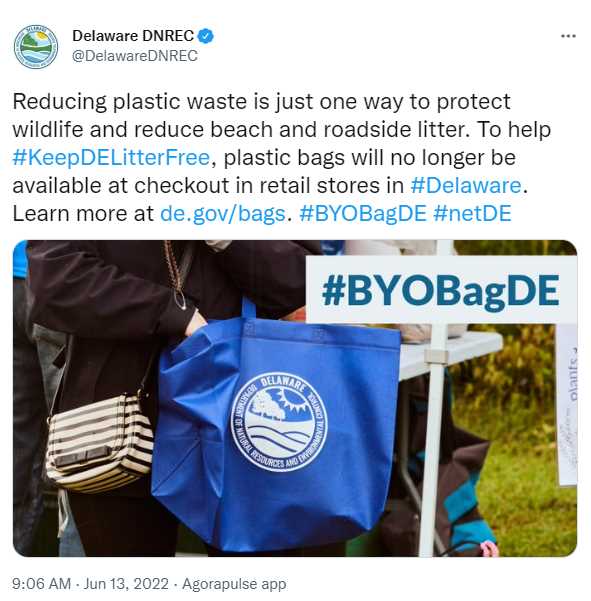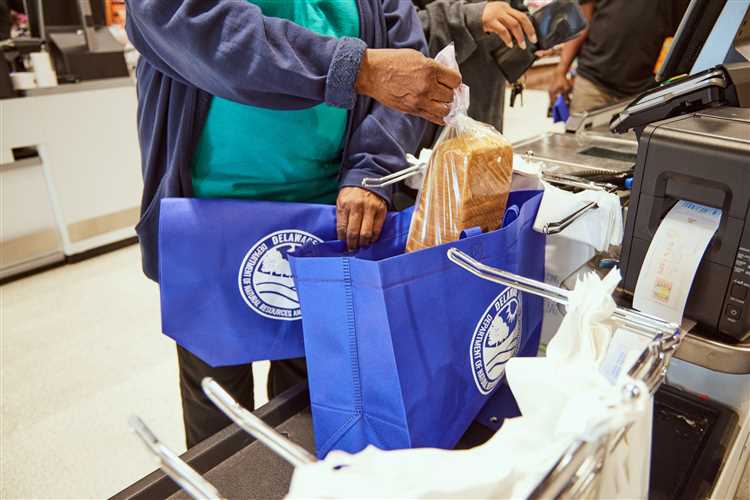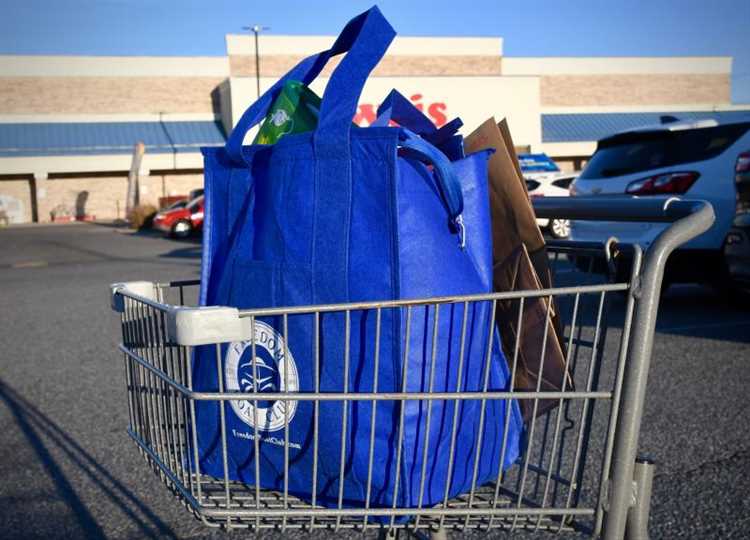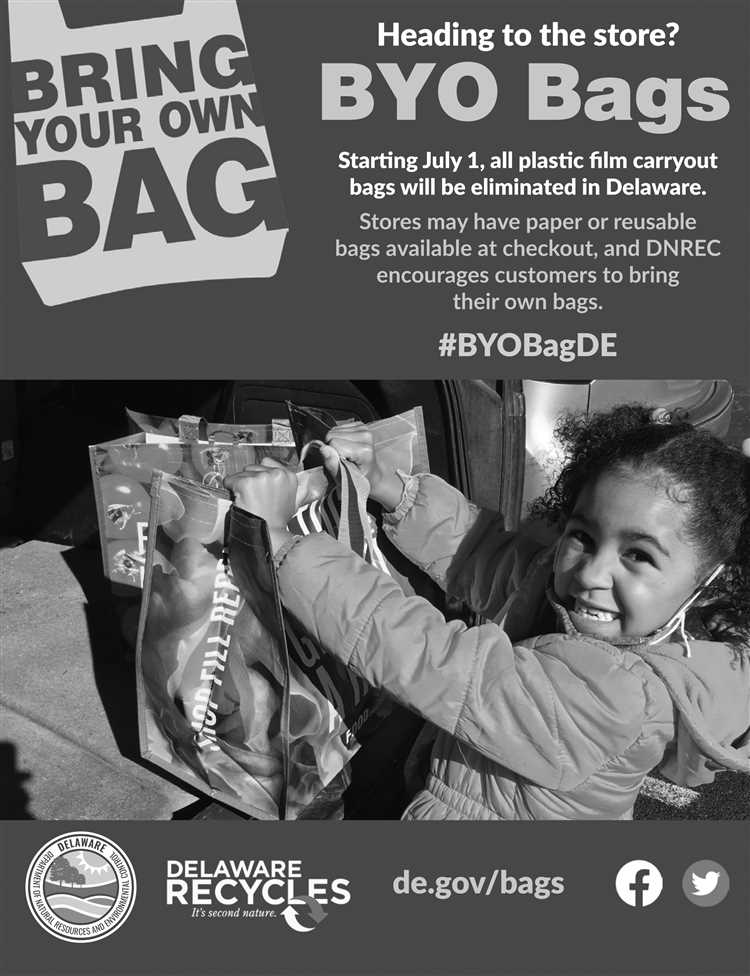Delaware, the second smallest state in the United States, has taken significant steps towards reducing single-use plastics by implementing plastic bag laws. These laws aim to address the environmental concerns associated with plastic pollution and promote sustainable practices.
Since January 1, 2021, the use of single-use plastic bags has been banned in large retail establishments, including grocery stores and pharmacies, across the state of Delaware. This ban was implemented to encourage consumers to opt for reusable bags or other eco-friendly alternatives.
The plastic bag ban is part of Delaware’s larger efforts to protect its natural resources and wildlife, as well as to reduce waste and conserve energy. By reducing the consumption of single-use plastics, the state is taking a proactive approach towards achieving a cleaner and healthier environment for its residents and future generations.
Delaware’s plastic bag laws have been well-received by many environmental organizations and residents who support the reduction of plastic waste. However, some businesses and consumers have raised concerns about the inconvenience of carrying reusable bags and the potential increase in costs associated with the transition.
It is important for residents and visitors of Delaware to understand and comply with the state’s plastic bag laws to contribute to the overall environmental sustainability efforts. By making small changes in our daily routines, such as using reusable bags and reducing our reliance on single-use plastics, we can all play a part in creating a greener and more sustainable future for Delaware and beyond.
- Understanding Delaware’s Plastic Bag Laws
- Are Plastic Bags Illegal?
- Delaware’s Plastic Bag Laws
- The Benefits of Reducing Plastic Bag Usage
- Understanding Delaware’s Ban on Plastic Bags
- Exceptions to the Plastic Bag Ban
- 1. Thin Plastic Bags
- 2. Biodegradable Bags
- What are the Alternatives to Plastic Bags?
- Question-answer:
- Are plastic bags banned in Delaware?
- When did Delaware ban plastic bags?
- What types of businesses are exempt from the Delaware plastic bag ban?
- Can I still use plastic bags for certain purposes in Delaware?
- What are the alternatives to plastic bags in Delaware?
Understanding Delaware’s Plastic Bag Laws

Delaware has implemented strict laws regarding the use of plastic bags in an effort to reduce environmental pollution. These laws aim to protect the state’s natural resources and promote sustainable practices.
One of the key aspects of Delaware’s plastic bag laws is the ban on single-use plastic bags. Retail establishments are prohibited from providing or selling single-use plastic bags to customers. This includes grocery stores, convenience stores, and other retail establishments.
Instead of single-use plastic bags, retailers are encouraged to offer reusable bags made of environmentally friendly materials such as cloth or recycled paper. Customers are also encouraged to bring their own reusable bags when shopping.
In addition to the ban on single-use plastic bags, Delaware has also implemented a fee on paper bags. Retail establishments are required to charge customers a fee for each paper bag provided. This fee is intended to discourage the use of paper bags and promote the use of reusable options.
It is important for both retailers and customers to understand and comply with Delaware’s plastic bag laws. By doing so, they can contribute to the preservation of the state’s natural resources and help create a cleaner and more sustainable environment.
Are Plastic Bags Illegal?

Plastic bags have become a major environmental concern due to their negative impact on ecosystems and wildlife. In an effort to reduce plastic waste and promote sustainability, many states and cities have implemented laws and regulations regarding the use of plastic bags.
In the state of Delaware, plastic bags are not currently illegal. However, efforts have been made to encourage recycling and reduce plastic waste. Retailers in Delaware are required to collect a recycling fee of 5 cents per plastic bag, which is intended to incentivize customers to bring their own reusable bags.
Delaware’s Plastic Bag Laws
While plastic bags are not banned in Delaware, the state has taken steps to address the issue of plastic waste. In 2009, the Delaware Recycling Law was passed, which requires plastic bag recycling programs to be established at participating retail locations. These programs are funded through the 5-cent recycling fee collected by retailers.
The fee collected from the sale of plastic bags is used to support recycling infrastructure and educational initiatives. The goal is to raise awareness about the environmental impact of plastic bags and promote sustainable alternatives.
The Benefits of Reducing Plastic Bag Usage
Reducing the use of plastic bags can have several positive impacts on the environment. By switching to reusable bags, individuals can significantly reduce the amount of plastic waste that ends up in landfills and natural habitats.
In addition to reducing waste, using reusable bags can conserve resources and energy. The production of plastic bags requires the use of fossil fuels, which contributes to greenhouse gas emissions and climate change. By using reusable bags, individuals can help reduce dependence on non-renewable resources and decrease their carbon footprint.
Furthermore, plastic bags pose a significant threat to wildlife. Marine animals often mistake plastic bags for food, which can lead to injury or death through ingestion or entanglement. By reducing the use of plastic bags, individuals can help protect the well-being of marine and terrestrial wildlife.
Overall, while plastic bags are not currently illegal in Delaware, there are efforts in place to reduce their usage and promote more sustainable alternatives. By choosing to use reusable bags, individuals can make a positive impact on the environment and help create a more sustainable future.
Understanding Delaware’s Ban on Plastic Bags

Delaware has implemented a ban on single-use plastic bags in an effort to reduce pollution and protect the environment. The ban went into effect on January 1, 2021, prohibiting retail stores from providing plastic bags to customers at checkout.
This ban applies to all retail establishments, including grocery stores, convenience stores, and other businesses that distribute bags at the point of sale. Instead of plastic bags, customers are encouraged to bring their own reusable bags or purchase paper bags for a small fee.
This ban is aimed at reducing the amount of plastic waste that ends up in landfills and waterways, as plastic bags are not biodegradable and can take hundreds of years to break down. By encouraging the use of reusable bags, Delaware hopes to promote sustainable practices and reduce the impact of plastic pollution on local ecosystems.
The ban does not apply to certain types of plastic bags, such as those used for packaging loose produce, meat, or seafood. Additionally, bags used for prescription medications or newspapers are exempt from the ban.
While the ban on plastic bags may take some time for consumers and businesses to adjust to, it is a crucial step towards creating a cleaner and healthier environment for all Delaware residents. By reducing the use of single-use plastic bags, Delaware is leading the way in promoting sustainable alternatives and protecting the planet for future generations.
Exceptions to the Plastic Bag Ban
While Delaware has implemented a ban on plastic bags, there are certain exceptions to the law where plastic bags can still be used.
1. Thin Plastic Bags
Thin plastic bags, typically used for product packaging or protective purposes, are not included in the ban. These bags are often used in grocery stores to separate different types of products, such as fruits, vegetables, and meat. Although they are made of thin plastic, they serve a specific purpose and are necessary for hygiene and convenience.
2. Biodegradable Bags
Another exception to the ban is biodegradable bags. These bags are made from materials that can break down over time and are considered more environmentally friendly than traditional plastic bags. Biodegradable bags are often used by retailers as an alternative to single-use plastic bags, offering a more sustainable option for consumers.
Note: It is important to note that even though these exceptions exist, consumers are encouraged to use reusable bags whenever possible to reduce their impact on the environment.
In conclusion, Delaware’s plastic bag ban includes some exceptions for thin plastic bags used for product packaging and biodegradable bags. However, it is still recommended that consumers opt for reusable bags to minimize plastic waste.
What are the Alternatives to Plastic Bags?

Plastic bags have become a major environmental concern due to their harmful impact on the planet. Fortunately, there are several alternatives to plastic bags that are eco-friendly and sustainable. These alternatives include:
1. Reusable Bags:
One of the most popular alternatives to plastic bags is using reusable bags. These bags are made from durable materials, such as canvas or jute, and can be used multiple times. They are available in various sizes and designs, making them a convenient option for grocery shopping, carrying personal items, or even as fashion accessories.
2. Paper Bags:
Paper bags are another alternative to plastic bags. They are biodegradable and can be recycled, which makes them a greener option. However, it’s important to note that paper bags have their own environmental impact, as they require trees to be cut down for production.
3. Biodegradable Bags:
Biodegradable bags are specifically designed to break down and decompose quickly when exposed to natural elements. These bags are usually made from natural materials such as plant starches or vegetable oils. While they are more environmentally-friendly than traditional plastic bags, proper disposal is still necessary to ensure they break down properly.
4. Tote Bags:
Tote bags are versatile and reusable, making them an excellent alternative to plastic bags. These bags are typically made from sturdy materials like cotton or nylon and come in various sizes. They can be folded and easily carried in a purse or backpack, making them convenient for everyday use.
5. Mesh Bags:
Mesh bags are lightweight and breathable, making them ideal for storing fruits and vegetables or even as beach bags. They are often made from durable and washable materials like cotton or polyester. Mesh bags are a popular alternative to plastic produce bags and can be used repeatedly.
6. Compostable Bags:
Compostable bags are made from plant-based materials and can break down into natural elements. They are designed to be composted along with organic waste, such as food scraps or yard trimmings. These bags are a greener alternative to plastic and can help reduce landfill waste.
By opting for these alternatives, individuals can significantly reduce their reliance on single-use plastic bags and make a positive impact on the environment.
Question-answer:
Are plastic bags banned in Delaware?
Yes, plastic bags are banned in Delaware. The state passed legislation in 2019 that prohibits the use of single-use plastic bags in most retail establishments.
When did Delaware ban plastic bags?
Delaware banned plastic bags in 2019. The legislation was signed into law on June 7, 2019, and went into effect on January 1, 2021.
What types of businesses are exempt from the Delaware plastic bag ban?
There are a few types of businesses that are exempt from the Delaware plastic bag ban. These include small businesses with fewer than 20 employees, pharmacies, and restaurants that predominantly serve take-out food.
Can I still use plastic bags for certain purposes in Delaware?
While the use of single-use plastic bags is generally banned in Delaware, there are certain exceptions. Plastic bags can still be used for specific purposes such as packaging raw meat, poultry, seafood, or other perishable items and as bags for newspapers, dry cleaning, and wet items.
What are the alternatives to plastic bags in Delaware?
There are several alternatives to plastic bags in Delaware. Retail establishments are encouraged to provide recyclable paper bags or reusable bags to their customers. Shoppers can also bring their own reusable bags when shopping to reduce the need for single-use plastic bags.